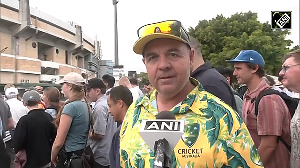'To win a medal at the Olympics you need 12 to 15 Virdhawals and Sejwals.'
'We lack a swimming culture.'
'Countries like the US, Australia, France and China are powerhouses, with access to the best facilities.'

With just weeks to go for the Rio Olympics, India's top swimmer Virdhawal Khade is burning it out at the Dharavi Sports Complex in north-central Mumbai.
The 24-year-old Kolhapur boy recently bagged a gold medal in the 50m butterfly event at the South Asian Games in Guwahati.
Khade is the youngest-ever Indian swimmer to qualify for an Olympics (the 2008 Olympics). Although he did not qualify for the semifinals of the 100m freestyle at the Beijing Olympics, he did finish first in his heat (Heat 3) and set a new personal best of 50.07 seconds, placing him 42nd overall.
He came 48th in the 200m freestyle and 32nd in the 50m.
Khade created history on November 16, 2010 when he won a medal (bronze) after 24 years for India in swimming in the 50m butterfly category at the 2010 Asian Games.
Despite qualifying in Grade B, the International Swimming Federation didn't include any Indian names for the 2012 London Olympics.
Aruneel Sadadekar/Rediff.com speaks to the aquatic ace about his plans for Rio.

Rio is around the corner. How is your training shaping up?
It has been a difficult one-and-a-half months for me. My main coach Subodh Dandke passed away. It affected me emotionally and has had a bearing on my training.
I was training with him for the past eight months and we had chalked out a plan. I had to start afresh. Thankfully, my assistant coach Devdutt has supported me since.
I undergo rigorous training in the gymnasium for two-and-a-half hours in the morning and follow it up with a high intensity swim session for two-and-a-half hours in the evening.
Sandeep Sejwal and you have been India's leading swimmers in the last decade. What should be India's realistic expectations at the Olympics?
I have qualified for the 50m freestyle event which requires a high level of strength. It gets over in about 22 seconds.
So when I am training in Mumbai, the focus is to do it at a very high intensity to improve my strength and timing.
Sandeep is training in Bengaluru, which has some good coaches. We also have another youngster, Sajan Prakash, who won many medals at the National Games last year; he is training in Bangkok.
For me, the aim is to hit my best timing -- 22.55 seconds in the 50m freestyle -- which I had managed in 2009.
I did reach 22.78 in the Nationals and if I am able to better the national record, I will be content.
 Why do we always speak about national records? Why don't our swimmers aim to win a medal at world events?
Why do we always speak about national records? Why don't our swimmers aim to win a medal at world events?
(Laughs) I can understand your frustration, but you need to understand that swimming is a physically taxing sport.
To win a medal at the Olympics you need 12 to 15 Virdhawals and Sejwals in the country.
Where is the competition in India? We lack a swimming culture. Countries like the US, Australia, France and China are powerhouses, with access to the best facilities.
Here, the Nationals are held irregularly, every 3 or 4 years. We need national competitions to be held every year to keep the sport in the news and get more young swimmers attracted.
Do you feel you and the other swimmers of the country deserve to train under a top-level foreign coach?
Do you think it will seriously make a difference?
Yes, we might improve technically, but the coaches in India are also good. Imagine, they train someone right from childhood, then the young swimmer decides one day to quit swimming after entering college, to concentrate on academics.
I have seen it. Even I had thought of quitting, but my parents supported me financially and kept me motivated.
You spoke about motivation. How difficult is it to keep yourself motivated in a physically and financially-challenging sport like swimming in India?
Very difficult! Thankfully, I got a job with the Maharashtra revenue department in 2012. Since then I manage my training expenses with half my salary.
When we speak about challenges, we also need to look at the ways we can improve it. Glenmark has been investing heavily in swimming in Mumbai. Likewise, other corporate houses need to come forward for the sport so that we can compete for world records.
If it is done now, we can think of having our swimmers in the Olympic finals by 2020, 2024.
What is your take on women swimmers in India?
I think the standard of women swimmers has dropped drastically in the last five years.
Earlier we had swimmers like Nisha Millet and Shikha Tandon, who kept the bar high. Now the competition is lacking.
Richa Mishra wins every swimming event in the country, which certainly exposes the quality.
Among the men, we can't train for multiple events. Every category requires specialised coaching and each category has its champion swimmers.
What needs to be done to improve the standard of women's swimming in the country?
I think it is about the mindset. India is a very conservative society and parents need to push their daughters to take up swimming.
Swimming for fitness is still picking up, but they need to encourage their girls to follow it professionally.
Indian women's swimming is a bigger problem than men's and needs to be bailed out.
How many years of swimming do you have left in you?
I hope to keep swimming at the competitive level at least till the 2018 Asian Games and will take it from there.












 © 2025 Rediff.com -
© 2025 Rediff.com -